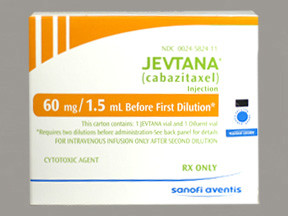CABAZITAXEL - INJECTION
PHONETIC PRONUNCIATION:
COMMON BRAND NAME(S): Jevtana
GENERIC NAME(S): cabazitaxel
Uses
USES: Cabazitaxel is used with another medication (prednisone) to treat prostate cancer. It works by slowing or stopping the growth of cancer cells.
How to use CABAZITAXEL - INJECTION
HOW TO USE: Read the Patient Information Leaflet if available from your pharmacist before you start using cabazitaxel and each time you get a refill. If you have any questions, ask your doctor or pharmacist. This medication is given by injection into a vein as directed by your doctor, usually every 3 weeks. A health care professional will give you the injection slowly over 1 hour. Your doctor may prescribe other medications (such as antihistamines, H2 blockers, corticosteroids) before each injection of cabazitaxel to lessen the risk of allergic reactions and prevent side effects such as nausea/vomiting. The dosage is based on your medical condition, body size, lab tests, response to treatment, and other medications you may be taking. Be sure to tell your doctor and pharmacist about all the products you use (including prescription drugs, nonprescription drugs, and herbal products).
Side Effects
Precautions
Interactions
Overdose
Images
Reviews
Warning
WARNING: Cabazitaxel may cause a serious blood disorder (a low number of white blood cells). This effect can lower your body's ability to fight an infection and thus lead to serious (rarely fatal) infections. Your doctor will monitor you closely and check your blood often during treatment. You may also receive another medication to reduce the risk of this side effect. If your white blood cell count is too low, you should not receive cabazitaxel. Tell your doctor right away if you develop any signs of infection such as sore throat that doesn't go away, fever, chills, cough, painful/difficult urination. Cabazitaxel may rarely cause serious allergic reactions. This drug must not be used in patients who have previously had an allergic reaction to it or to other medications containing polysorbate 80. Your doctor should prescribe other medications (such as antihistamines, H2 blockers, corticosteroids) to help prevent an allergic reaction. Get medical help right away if you develop any signs of an allergic reaction such as rash, itching/swelling (especially of the face/tongue/throat), severe dizziness, trouble breathing.
Disclaimer
IMPORTANT: HOW TO USE THIS INFORMATION: This is a summary and does NOT have all possible information about this product. This information does not assure that this product is safe, effective, or appropriate for you. This information is not individual medical advice and does not substitute for the advice of your health care professional. Always ask your health care professional for complete information about this product and your specific health needs.


No Reviews Yet